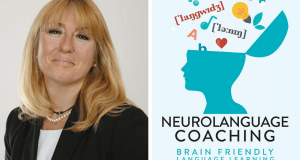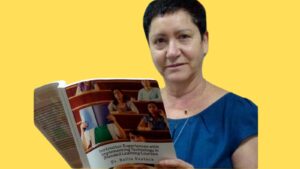by Sharyn Collins
40 years teaching and training, specialist in the history of ELT methodology, mentor to countless teachers and trainers, still innovating and poking the traditional ELT bear!
Steve, I was fortunate to make your aquaintance last year, when you gave at talk at Millfield School for EdYOUfest organised by Gallery Teachers. I was so impressed by your work shop on the Cuisenaire rods and with your ability to entertain us with your guitar, but before we go into that but could you tell me how this all started for you? Did you like so many EFL teachers, fall into EFL?
Actually I really did fall into it. I’d been in the navy and then gone into social work. After that I was working as a musician in Switzerland and my girl-friend’s father asked me to teach a group of toxicologists. I didn’t know what I was doing and certainly didn’t do a very good job but I realised that that there must a better way. So I took the IH Hastings Cert course and did very well. That’s what launched me and it’s also what set the training bar very high indeed for me.
Where did your love of music come from? I understand you have quite a large collection of instruments?
In Switzerland I was playing with an Irish band, Guitar, Bodhran and Portuguese Fado, also with a blues duo and solo too. Basically, I was playing every day. Right now I have an extensive collection including a Double Bass, Clarinet, two Charangos, three Guitars, a Saz, a beautiful Chinese Gu Zheng and various other stringed instruments and flute-type instruments. Wherever I go, I try to find a local instrument and as a consequence, I have some interesting things. Music was always part of my life, my father used to sit me on his knee and get me to follow, for example, the oboe part of a classical concerto. But I don’t read music, everything I do is by ear.
Do you think that having a good ear for music has helped you in your language learning and teaching?
Well, this is a tricky one! They also say that music and maths are somehow connected yet I am very poor at maths but quite good at music. Perhaps the concept of ‘music’ is worth clarifying to understand better what is being suggested. If one is talented at playing what I’ll call ‘structured music’, that is, classical for example, one may find some mathematical equivalences but if one doesn’t read music and plays from the heart, as it were, then I can’t see any connections. As to music and language, here too, I can’t see any obvious links with ability, other than an ease to better identify and reproduce the ‘music’ of a tonal language! Having said all of that, I do like using music in language learning; I think the combination of tone and rhythm helps the memory. That’s why we often recall poems and nursery rhymes from many years ago. Of course Lozanov’s Suggestopedia uses various kinds of music as a powerful support to memory. So for me, music and language have intrinsic connections but only inasmuch as they complement each other.
You have had a career in ELT for over 40 years. Could you summarise your career to date?
I did my training at International House as I mentioned and I started as a teacher in an IH school in Italy. I became Director of Studies quite quickly (which in hindsight was a mistake as I didn’t have the managerial experience) and then spent the following years learning about all kinds of ways to teach. I paid no attention to the research at that time in my career but wanted instead to experience various approaches. I spent time studying Suggestopedia and Silent Way in particular as well as others of the Humanistic Approaches and Neuro Linguistic Programming, which at the time I thought might have an important part to play in teaching and learning. Later I realised that it has little or nothing to offer teachers but that might be a subject for another time! During those years I also started delivering some teacher training and development workshops, mostly for beleaguered state school teachers who needed some inspiration. That experience taught me a lot about what teachers have to suffer in order to do their job and I became determined to find ways to make life easier for them, if I could.
Later I worked in UK Higher Education as a Senior Lecturer in Applied Linguistics and ELT as well as delivering highly successful initial teacher training courses thanks to a dream team of tutors.
I left Higher Education and took on the Principalship of an old UK language school which gave me the opportunity once again to manage a team of skilled and motivated teachers. My final move before retiring was to join a company in China as Vice President responsible for ELT in its various schools around the country, I enjoyed that challenging experience very much.
So that, in a nutshell covering almost 40 years, is my career! The highlights must be twice winning the Walpole Prize for Innovation in Teaching, being able to take whatever experience I have accumulated to teachers all over the world and lastly, having teachers I trained 10, 20 years ago get in touch to say thanks and let me know what they’re doing now. Many are in senior positions now which makes me feel old!
Differently from my beginnings as a teacher, I now feel that a thorough knowledge of the research pertaining to our field is essential to understand what we and our students are doing and why. I try very hard to pass this on to teachers by creating practical connections between the literature and what they do every day.
As I mentioned earlier you gave a workshop on the Cuisinaire Rods from which I learnt such a lot. For those who didn’t see your workshop could you tell us a bit more about the rods?
The Cuisenaire Rods are integral to Silent Way and since last year I presented some uses of the Rods at EdYOUfest, I thought this year, I’d discuss their use within the more specific context of the principles and elements of Silent Way. Silent Way is enjoying a certain renaissance as more and more teachers discover it, most who weren’t even alive at the time when Gattegno was promoting his extraordinary ideas on education, not just language education. You don’t have to do Silent Way to use the Rods but you do have to use the Rods if you do Silent Way! As a matter of interest, I have been working on a book on the use of the Cuisenaire Rods for more than 20 years! Will it ever be finished?
I know that you are passionate about teacher training and development and that you have your own Facebook page supporting this.
I certainly am and can I just briefly outline one of my soap-box topics? Initial Teacher Training, about which I have written several articles, is an essential part of forming a good teacher but the duopoly of exam boards in the UK have lost sight of the necessary components of that process in favour of quasi academic writing and a boot-camp type atmosphere. It’s time for change if we value excellence in language teaching.
My professional Facebook page ) is just my small way to promote the idea that Second Language Acquisition research is not boring, can be made relevant and can be explained using every-day language. I am irritated by academics who use hifalutin language unnecessarily. It’s almost as though some of them prefer to keep their ‘special research’ secret or within their own professional domain. I also use that platform to suggest ideas I have, support certain ELT movements and so on. Don’t get me wrong, I am not anti-academic, on the contrary, I love the fact that there is a huge body of linguistic and applied linguistic research stretching back more than 100 years but it tends to be inaccessible to those who could most benefit from it: language teachers! Journals which publish such research are expensive and most teachers can’t afford to subscribe and then having to plough through reams of data and impenetrable scientific language can be an unattractive proposition for hard working, time-poor teachers. I am also not suggesting that research has all the answers, it certainly doesn’t but it can help to explain why we do or don’t do certain things. We have a very long way to go before we completely understand the processes involved with learning a language but why not make use of all available information?
Steve you have very kindly contributed any articles and book reviews to the magazine over the years and I see no signs of retirement. In fact this month, you have written an article on the communcative language testing which you have devised. The article is very clear, but could you tell me why you decided to set about such an arduous task?
Well, I started writing this test more than 5 years ago but I don’t have the huge promotional machine that is really needed to get it accepted as do the big exam boards. So it’s a slow process. I have used it in Russia and in Bulgaria, in fact I’m back in Bulgaria during early June, this time in 2 centres, in Sofia and Vidin. Teachers are sometimes surprised that I don’t want them to ‘prepare’ students for the test; the whole idea is that people who take the test are exposed to real language and can react just as they would in the real world with no prepared theme.
So far, the feedback both from young and adult learners has been excellent – students like the relaxed nature of the test and also that everybody gets a score in various categories. I like to think this encourages them. Of course, my test doesn’t have world-famous accreditation attached to it and several language schools (particularly in Germany) have declined trying it, simply for this reason. I think that’s a shame – it’s rather like schools who won’t take teachers straight from a Cert. TESOL or CELTA but only with years of experience. So where are those new teachers supposed to get their experience? It’s a catch 22!
Part of the test looks at one’s ability to achieve a communicative goal and that idea really comes from several amusing experiences I had as a youngster travelling around here and there and trying to do things in the local languages.
To be honest, I’ve never been into testing – of anything really. It encourages back-wash (teaching to the test) and often doesn’t demonstrate anything other than the ability to pass a test. That’s kind of where I started thinking how I could create a test which isn’t really a test but a fun yet challenging experience resulting in some kind of tangible comment on where your language is at the moment.
Thank you very much for taking the time to do this. I want to thank you personally for all the advice and information you have passed to our readers during my editorship and I look forward to many more in the future
Thanks very much, it’s been a pleasure.







